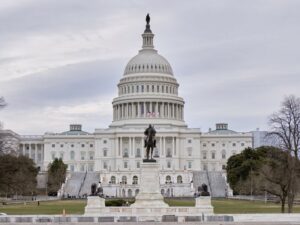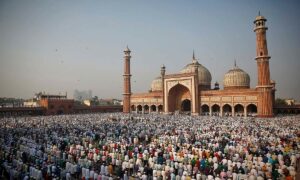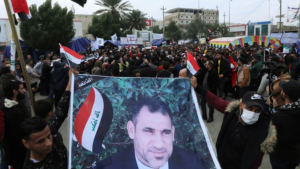
The National Interest Foundation Newsletter
Issue 23, December 12, 2019
Welcome to this week’s edition of the NIF Newsletter. In our domestic headlines: U.S. Secretary of State Pompeo meets with Russian Foreign Minister Lavrov in Washington D.C., and Speaker Pelosi directs the House to draft articles of impeachment against President Trump. Meanwhile, around the world: India passes a controversial bill which would mandate a religious test for citizenship, Finland’s Parliament approves the nomination of the world’s youngest Prime Minister, and dozens of demonstrators are killed in the latest round of violence against Iraqi protesters.
United States
Pompeo Meets with Lavrov

Russian Foreign Minister Lavrov met with U.S. Secretary of State Pompeo and U.S. President Trump in Washington D.C. earlier this week. (Photo from CNAS)
Pompeo and Lavrov Meet in Washington D.C.
U.S. Secretary of State Mike Pompeo met with his Russian counterpart, Foreign Minister Sergey Lavrov, in Washington D.C. on Tuesday afternoon. Foreign Minister Lavrov also met with President Trump later in the day. Secretary Pompeo warned Mr. Lavrov that renewed Russian interference in American elections would not be tolerated. President Trump also warned the Russian Foreign Minister over his country’s actions in jeopardizing the legitimacy of American elections. Non-proliferation was also on the agenda, but Secretary Pompeo stressed his reluctance to negotiate any nuclear deal that China was not part of.
Articles of Impeachment

The House of Representatives drafted two articles of impeachment against President Trump this week. (Photo from AP)
House Unveils Articles of Impeachment Against President Trump
House Democratic leaders unveiled the two articles of impeachment that they will charge President Trump with, a few days after Speaker Pelosi announced that the House of Representatives would officially move forward with formal impeachment proceedings. The President is charged with abuse of power and obstruction of Congress in relation to the ongoing Ukraine scandal. In the formal paperwork, President Trump is charged with “corruptly soliciting” election help from the government of Ukraine in the form of slandering his political rivals. The President is also accused of obstructing Congressional inquiries on an unprecedented scale, including defying and blocking legally-issued subpoenas.
Around the World
India

India’s Muslim population is threatened by another law which many have argued seeks to make them second-class citizens. (Photo from Reuters)
India Passes a Controversial Bill Regarding Naturalization Policy
Indian Prime Minister Narendra Modi and his ruling Bharatiya Janata Party (BJP) proposed a controversial bill that would alter India’s naturalization policy by creating a religious test for migrants who are trying to become citizens. The bill, named the Citizenship Amendment Bill, was passed in both houses of Parliament – first on Tuesday in India’s lower house, the Lok Sabha, and then on Wednesday in the upper house, the Rajya Sabha. With it passing in both houses, the legislation is now set to be signed into law. The Modi Government has defended the bill by saying it aims to protect persecuted Hindus, Buddhists, and Christians who migrate from other countries in Southeast Asia. However, Muslims in India fear it is yet another attempt by the Modi Government to create a hierarchical society in which Muslims are second-class citizens.
Finland

Sanna Marin, 34, has been named the next Prime Minister of Finland and will replace the outgoing leader, Antti Rinne – who resigned from the position last week. (Photo from RTTNews)
Finland’s Parliament Approves the Nomination of the World’s Youngest Prime Minister
This week, Finland’s Parliament approved the nomination of Sanna Marin, the 34-year old Finnish Minister of Transport and Communications, as the country’s next Prime Minister. Of the Parliament’s 200 members, 99 voted in favor of her nomination and 70 against it, with 30 members absent from the vote. As she officially takes the role, Marin will become the world’s youngest sitting Prime Minister. She was elected by her party, Finland’s Social Democratic Party, to the post of Prime Minister following the resignation of outgoing leader Antti Rinne – who resigned after losing coalition partners over the handling of a postal strike. She will head the country’s coalition government which consists of five parties, all of which are led by women as well. In addition to becoming the world’s youngest sitting Prime Minister, Marin will also make history as the Scandinavian nation’s youngest-ever head of government.
Iraq

Iraqis have gathered to mourn a prominent activist shot dead during the latest violent episode of anti-government demonstrations, in which more than 450 people have died. (Photo from Reuters)
Iraqi Protests Encounter an Increase in Death Toll
More than 450 people have died since anti-government demonstrations demanding more jobs, better public services, and an end to a corrupt failing political system began early October in Iraq. Iraqi officials said recent casualties had increased to 25 dead and more than 100 injured after unknown gunmen targeted anti-government demonstrators this past weekend. The attack last Friday, leading into the early hours Saturday, was among the deadliest since the protests began. Dozens of protesters have also gone missing and have yet to resurface after an attack took place on a parking complex that was being used as a sit-in.
